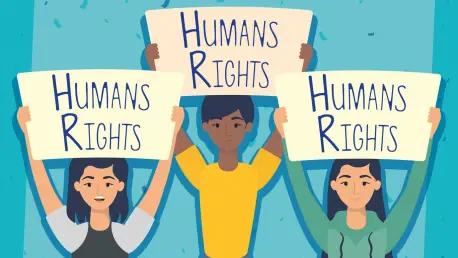In recent developments, the interim government of Bangladesh has taken decisive action by approving a draft Memorandum of Understanding (MoU) to establish an Office of the United Nations High Commissioner for Human Rights (OHCHR) in the country. This move reflects a growing commitment to confront and address human rights issues within Bangladesh. Led by Chief Adviser Muhammad Yunus, the council of advisors endorsed the MoU, marking a significant step in fostering collaborations with the OHCHR. This decision was further articulated by law adviser Asif Nazrul during a recent press briefing, highlighting the substantial talks that have taken place between Bangladeshi authorities and the OHCHR.
Anticipation surrounds the establishment of the office, which is projected to operate in Bangladesh for an initial three-year term, with opportunities for renewal contingent on mutual agreement. This development aligns with the efforts of the OHCHR to expand its reach and support global human rights norms through its network of country and stand-alone offices. These offices play a crucial part in executing mandates that involve oversight, analytical work, and technical assistance to buttress human rights protections and nurture interactions with civil society and local authorities.
Advancements in Human Rights Dialogue
The approval of this MoU underscores significant advancements in the discourse between Bangladesh’s interim government and the OHCHR. Emphasizing the collaboration, law adviser Asif Nazrul highlighted the utility of OHCHR’s report that delves into serious allegations of genocide and crimes against humanity linked to uprisings in July, leading to the deposition of the Sheikh Hasina-led Awami League administration. Such detailed reporting has underscored necessary improvements and potential punishments for those implicated in the orchestrated dissents. This development further aims to reinforce the establishment of state human rights agencies, which, alongside the OHCHR’s local presence, will serve as pivotal avenues to investigate and resolve human rights violations comprehensively.
This aligns with previous findings by an independent UN fact-finding mission, which reported systematic abuses carried out by the former regime amid the protests. In anticipation of the office’s functioning, there is an expectation of enhanced scrutiny and investigative efforts to ensure that human rights breaches are diligently addressed. Bangladesh has hence positioned itself as a proactive nation willing to collaborate with international bodies to enhance oversight mechanisms. The dialogue between OHCHR and Bangladesh represents a promising breakthrough in promoting transparency and dispensing justice within the region, setting a precedent for robust human rights governance.
UN’s Expanding Global Presence
The inauguration of an OHCHR office in Bangladesh also speaks to the broader scope of the UN Human Rights Office’s international strategy. Globally, the OHCHR has committed to deploying its resources in various country offices to support and propagate human rights standards. Through its interactions with host governments, these offices engage in implementing comprehensive policies that ensure human rights violations are tackled effectively and constructively. The strategy involves offering technical aid and building the capacities of national entities to curate a more inclusive and fair society.
The visit by UN High Commissioner Volker Türk in October 2024 symbolized support and dedication to this cause. His presence highlighted the criticality of establishing a localized presence in Bangladesh, thus reinforcing the UN’s ongoing endeavor to scrutinize human rights situations meticulously. Türk’s visit underlined cooperation efforts aimed at driving thorough investigations, increasing transparency, and facilitating resolutions to human rights concerns. Recognizing local nuances while advocating for universal rights principles forms a core component of the OHCHR’s global agenda, augmenting its efficacy in emerging economies like Bangladesh.
Implications for Bangladesh’s Human Rights Landscape
The interim government of Bangladesh has made a notable advancement by approving a draft Memorandum of Understanding (MoU) to establish an Office of the United Nations High Commissioner for Human Rights (OHCHR) in the country. This decision underscores a renewed commitment to addressing and managing human rights challenges within Bangladesh. Under the leadership of Chief Adviser Muhammad Yunus, the council of advisors has ratified the MoU, representing a crucial step toward fostering partnerships with the OHCHR. Law adviser Asif Nazrul detailed this move during a recent press conference, emphasizing the significant discussions between Bangladeshi officials and the OHCHR.
The proposed office is expected to function in Bangladesh for an initial three-year period, with the potential for extension based on mutual consent. This initiative corresponds with the OHCHR’s mission to broaden its influence and promote global human rights standards through its network of offices. These offices are instrumental in performing key mandates, providing oversight, conducting analyses, offering technical support, and encouraging collaborations with civil society and local organizations.









